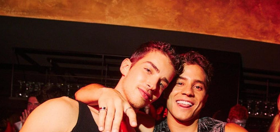
Life in showbiz has its twists and turns, especially for performers on the wicked stage.
Just ask Garrett Clayton and Jared Gertner. The two appear in A Snow White Christmas, opening this December 13 at the Pasadena Civic Auditorium. Former Disney kid Clayton made a splash in Teen Beach Movie before moving on to Hairspray Live and King Cobra. During the promotion of the teen bullying drama Reach last year, Clayton came out. He also announced his engagement to longtime boyfriend Blake Knight.
Gertner won acclaim on the Broadway stage when he replaced Dan Folger in The 25th Annual Putnam County Spelling Bee, and later, for playing the lead in the first national tour of The Book of Mormon, and in the Broadway production. He also boasts a long television resume, having appeared on The Good Wife and How I Met Your Mother. Gertner married his husband Jeffrey Marshek in 2010, and the couple also became dads with the birth of their son Auggie in 2015.
Now Gertner & Clayton join a cast that includes Michelle Williams (Destiny’s Child), Neil Patrick Harris, Olivia Sanabia (Just Add Magic) and Michael Campion (Fuller House) in A Snow White Christmas, a special holiday extravaganza in the style of British pantomime.
How about we take this to the next level?
Our newsletter is like a refreshing cocktail (or mocktail) of LGBTQ+ entertainment and pop culture, served up with a side of eye-candy.
We caught up with the two just ahead of the Los Angeles opening to chat about the holiday show, life as performers, and what it’s what post-coming out life is like in the entertainment industry.
A Snow White Christmas runs December 13-22 at the Pasadena Civic Auditorium.
How do the holidays come to Snow White? What can you tell us about the story?
GC. It’s set at Christmas. We also do some original twists on the story. We reimagine it a little bit.
JG: I wouldn’t call it traditional, other than we have the main ingredients: Snow White, the poison apple, the wicked queen, dwarves. The rest of it we’re starting from scratch. It’s more about the tradition of British Panto, which is to take classic stories and turn them on their heads, and add a lot of contemporary music and silly gags. They always do them around the holidays, so they always add a holiday element to it. For us, Snow White is sad because there is no Christmas in the kingdom. Everyone’s miserable since the evil queen took over. So in the end, we want to bring Christmas back to the kingdom.
This is also very specific, in that you’re doing a Panto. For our readers, how would you describe it?
GC: Panto is a couple hundred-year-old tradition in the UK. The Lythgoes [who produce the show] have dedicated this season for the past 10 years to expanding the show in different regions. The goal is to have it be a tradition in the US as well because it then introduces theatre to kids in a way that feels more accessible.
JG: I got to know Panto pretty well because I did Book of Mormon in London for almost two years. I knew what it was coming in, and I’m really excited to be part of a family that brings it to the States. There really isn’t a reference point for it here. In the UK, everyone does Panto, and everybody sees Panto. There are small productions in every town. And there are huge productions in the West End, or in stadiums. People from television star in them. People from the West End star. Everybody goes. Our closest reference would probably be children’s theatre, but that’s not really what this is. What’s special about Panto is that it’s fun for adults and kids. There are jokes and humor that only adults will get, and there’s silly humor for kids. So it’s got a little bit of everything.
GC: We have a lot of interaction during the show. It’s really just a fun, interactive experience. When the heroes come out, we ask you to cheer them. When the villains come out, we ask you to boo. We ask kids questions during it. There’s a line in the show where the prince asks “There’s a girl who has hair black as night and skin white as snow.” Yesterday, the kids started screaming “Snow White.” That’s not something we ask, but the best part is the kids get so into it that they can’t help themselves. They’re screaming “Snow White” at the stage. And my character’s like oh, just voices in my head. So the adults get a kick out of it, because the kids just scream it louder. It really is the best of it.
That’s fun.
GC: Another thing we do in the show is incorporate modern music and local references to wherever we’re mounting the show. The Huntsman, my character, gets to sing “I’m Still Standing,” the Elton John song. We reconstructed it. Instead of the Chris Hemsworth version of [the character] I’m a nerdier character that gets pushed around by his ruler. In the second act I have a turning point where I find courage. We’ve done it in Houston, in Nashville, in Raleigh. We always do local references so the region we’re in—they always feel like they’re home is part of the story. It’s tailored to them. So it’s fun, interactive and respectful of the community. I think adopting [Panto] into American culture would be really fun and an easy tool. It’s all holiday stories, but you get to put a different spin on it with music from different decades.

Jared, is it odd being Jewish and doing a Christmas show?
JG: A little bit. There is a little bit of my grandmother…I can hear her say “What are you doing!?”
[Laughter]
But I try to bring my Jewish sensibility to it. It works out ok. The fact is, Jews don’t hate Christmas. We just don’t celebrate it. The music is so fun and being festive and having a great time is fun no matter what religion you are. Really, the Christmas element is sort of a side element of the Panto. It’s more about Snow White. Though, at the end, we all come out and put a present under the Christmas tree before bows. I’ve persuaded them to let be bring out a big menorah to leave under the tree. So I am representing for my people.
This also isn’t the first Panto for either of you, if I’m not mistaken. Why do you keep coming back?
GC: Every year they always let me do different stuff. I really love the message. I have younger siblings, so I really hope that the area they’re in, they invest in the arts. Whether or not they choose to utilize it is up to them, but I really want to have that option open to them. So I think experimental theatre and putting my voice into things that can support the arts and community is really important. And not just because of what I do; I wouldn’t have found the strength to be myself if I didn’t have these tools. And the younger dancers in the show are all local. We also think of it as a bit of a mentoring so [the local performers] can see how to do it for a living and how to be respectful and how to be a collaborator. So it’s not just us putting on a fun show. There are so many elements to this that are important.
And for you Jared?
JG: I love it. Panto is sort of where I like to live the most. It’s fun and its silly. There’s a lot of audience interaction, a lot of improv. So I guess I get to call on a lot of the other skills I’ve honed over the years. The music is amazing. The choreography is so fun. I love the audience interaction the most. This is my third year doing Panto, so the role I usually play is the one that does the most talking back and forth with the audience. It has the most opportunity for improv. You get to have so much fun. There are so many shows where you have to dig really deep in the acting, or its vocally really demanding, or it’s very specific comedy. When you do Panto, you just go crazy. I get to party on stage, and I love that.
Both of you have film & TV resumes, but you both do a lot of stage work. Does doing stage satisfy you in a way that on-camera work does not?
JG: I think the immediacy of it, the instant gratification you get from the audience.
GC: Completely. It’s funny, people are always asking if I prefer one form other another. They all bleed into each other in different ways. I get to try things out on stage and know right away if they work, whether it’s dramatic or comedic or anything in between. I get so much experience on stage doing different shows that I always am trying different things. On camera, you don’t have that. What you do in that moment will live on forever and there’s not an audience to tell you if they liked it or not. I feel like [theatre is] the best experimental space. You get to sharpen your tools and know what kind of performer you are and what you can do to the best of your abilities.
Related: EXCLUSIVE VIDEO: Garrett Clayton takes on male bonding in ‘Peel’
JG: Most importantly, the community that comes with theatre is something I really crave. I love being part of the Broadway community. I love the family that forms when you’re in a cast with different people. There’s something, because you have to say “Ok guys, let’s trust each other and do this,” you have to put so much trust and faith and love into one another that you form this bond that is unlike anything else. I’ve done a bunch of TV shows, and they are always fun. But Los Angeles feels…more insular. You’re sort of on your own. You can make connections, but it’s not like theatre. There’s nothing like starting a process with a group of people that you’ve never met before, and a few weeks later, you can’t imagine life without them. I love that part of theatre.

Jared, you’re also a dad to your son Auggie and married to your husband Jeffrey. How do you balance touring with maintaining a marriage and fatherhood?
JG: It’s very difficult. My husband and son are on an airplane as we speak coming to see me here in Raleigh, and I’m chomping at the bit. I spent many, many years doing theatre, traveling all over the place. When I got married, I continued that, but it became more difficult because I felt myself pull toward my husband. I didn’t want to go away for too long. We made it work. When Augie, our 4-year-old came along, it made things much more difficult. We moved to Los Angeles because we wanted a lifestyle that would allow us to be a family unit more so than in New York where I would have to travel a lot for theatre. So that’s why I’ve been focusing more on television and voice over the past few years. Because I can’t not do theatre—I need that, to scratch the itch—I do a few theatre jobs a year. It’s much less than it used to be, and I miss that in my life. But I prefer to be an active, present member of my family. So I set limits that I won’t be away from my family for more than three or four weeks at a time.
Understandable.
JG: I worked so many years saying yes to everything that now I can say no to things and be selective and do what works for my family.
Have you noticed attitudes shift in the past few years with Trumpism?
JG: We have mostly been very lucky as far as how people treat us as a family. However, we’ve only ever lived in Los Angeles, or New York City or London. So when we travel, we try to be a little more aware of our surroundings. But we haven’t had too much trouble. I will say that post-2016 election we had a couple incidents on social media where people would pipe in and comment on a post or a picture. That would turn into a whole thing.
Somehow that’s not surprising.
JG: We try to take it in stride. Because we got married nine years ago and had a baby almost five years ago, we were a little ahead of the curve. So we view it as an opportunity, and perhaps an obligation, to help educate people on families like ours. So when people ask questions, I try to be patient and open. I try to answer in a way that will help them understand who we are, what we want, and how we’re not that different from them. Where it’s getting tricky is now that my son is old enough, I have to be more protective about the kinds of conversations we get into when he’s around.
Like what?
JG: We’re not comfortable discussing the process of making him. We’re not comfortable discussing money and finances ever, though everybody always asks. We try to create the narrative ourselves for him, to help him understand how he came to be without people demanding an explanation in front of him.
How has being a dad affected the kinds of roles you accept?
JG: Well, I desperately want to play dad characters now since I have so much to draw on. Unfortunately, I’ve been saddled with this baby face I can’t seem to get rid of.

It’s a good problem to have.
JG: Even though I’m almost 40, people have a hard time giving me roles as dads. What I’ve noticed most is a difference in my work. When you become a parent you open up parts of yourself that you didn’t even know you had. I liken it to opening an extra board in a video game. It’s like I had no idea that was even there! It’s just feelings and access to all these things you didn’t know you had. Once I became a parent. So I’ve been able to do some darker work and draw on things I didn’t realize I could do before. That’s actually been a really nice side effect.
Garret, it’s also been just over a year since we chatted about your coming out. How has the year treated you?
GC: I think even in the time I’ve been working professionally the industry has taken leaps and bounds every year in demanding positive change and being respectful. So I feel that since I have come out, I’ve not only gotten to audition for a wider range of characters, but I feel more confident in who I am. I’ve taken a step into feeling more comfortable in a way that I did before I moved to LA. I’ve found a lot of support and love.
Have you noticed a difference in the kinds of roles you’re offered?
GC: I’ve gotten to play a wider range of characters. I just went from playing Pennywise the clown to playing the Huntsman.
That’s a leap. So what’s next for the two of you?
GC: I have a concert the day after we close. Then I’m doing a New Year’s Eve show. There are some projects I’m talking about for next year, but I can’t say what they are until anything is official.
JG: I’ve actually been writing. I have a couple of pilots, one of which we have been pitching and it’s getting really good attention. Then, another one, once we get back to town we’re going to be pitching to someone very exciting, but I can’t talk about it. So I’m in the process. Hopefully, that will be the next chapter.
A Snow White Christmas runs December 13-22 at the Pasadena Civic Auditorium.






















